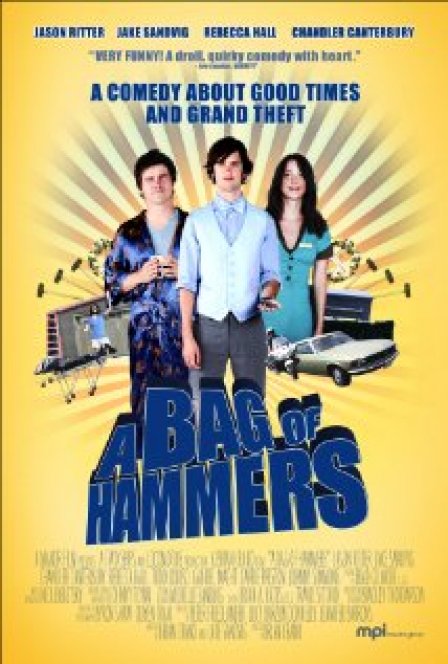In the first scene of director Brian Crano’s A Bag of Hammers, Alan (Jake Sandvig) begins to ask the question, “Who would win in a fight—” But before he’s even had the opportunity to name the opponents, Ben (Jason Ritter) immediately replies, “Ultimate Warrior.” Alan complains that Ben hasn’t heard the options yet so he can’t answer, but Ben stays firm: regardless of who is fighting, Ultimate Warrior would win. This game continues throughout the next few shots as the characters stand curbside in a graveyard.
This half-joke is a good introduction to the attitudes, challenges, and choices that continue throughout the duration of A Bag of Hammers. While you get the impression that these hypothetical matches are the only definitive choices Alan and Ben can make, it also points to the series of difficult decisions the characters will eventually be challenged by and resolve. When these playful deliberations become careful evaluations with real consequences and rewards, each character must reassess their decisions with new perspective and gravity. But while more serious in tone, these new choices and solutions seem just as implausible and unrealistic.
Alan and Ben are twenty-something grifters living and swindling in California in the mid-2000s. Aimless, seemingly untouchable, and without much conscience, these two display many of the characteristics typical to the hapless generational subset recently redefined as the emergent adult. Though the two are fairly successful despite their almost brazen lack of regard for the law, they’ve seemed to work out an arrangement that has allowed them to sustain a lifestyle of slacker pleasures, dodging full-fledged adulthood while easily navigating the unique pitfalls of their profession.
Their most lucrative scam is cemetery valet parking, a routine in which Alan and Ben steal mourners’ expensive cars. When they accidentally take Ben’s ex-girlfriend’s Mercedes at her father’s funeral, we begin to understand the extent of their emotional failings. Ben’s ex Amanda (Amanda Seyfried) reams them out, faulting Ben for his unbreakable “emotional exoskeleton,” and you can tell that this speech is something she’s been brooding over and preparing for some time. Even though it sounds like she’s reciting bad teenage poetry — or “Michael Bolton lyrics,” as Alan accurately observes — it seems only appropriate that this level of superficial intimacy is all Ben has the capacity to achieve at this stage of life.
Yet there are glimpses of real compassion that might eventually mature into substance. Alan and Ben rent out the neighboring house to a single mother named Lynette and her son Kelsey, who have been recently displaced (allegedly) by the destruction of Hurricane Katrina. When Lynette can’t find work and is unable pay the full amount for the property, Alan and Ben offer to lower the cost. Her struggles with unemployment and motherhood are well-documented through several clumsy interviews and episodes of careless parenting, during which her fragile personality teeters between adolescent and volatile, making her unlikeable and desperate. The effects of this oscillation are evident by the behavior of her son: Kelsey has taken on the responsibility of caring for himself, preparing his meals (which largely consist of soda or something microwaveable), and attending school despite the new kid tortures of bullies.
Work is an essential component of this film, and the characters are distinguished by their jobs or the attitudes they have towards employment. Alan and Ben steal. Alan’s sister Mel (Rebecca Hall) works an honest, but at times demeaning job as a diner waitress, where it’s company policy to perform the wiggle dance and jingle upon the customer’s request. Lynette can’t find work but is desperate to be employed. And Wyatt, Kelsey’s teacher, just left a position in child welfare services where it appears he became too emotionally taxed. Each character’s struggle — whether it’s personal, financial, or moral — is a clue as to how they will act. It’s also an area that provides a venue for personal reflection and progress.
When calamity strikes, it serves as a catalyst for Alan and Ben’s partial transformations. After deciding to raise Kelsey, they are instantly immersed in the complications of creating an unofficial family and begin to recognize their own deficiencies. Unfortunately, this film finds its own deficiencies when it attempts to be too serious. It can’t find a way to successfully transition from the entertaining quips and antics of Alan and Ben to the sobering realities of maturity. A speech Ben gives Kelsey at his mom’s work tries to be sincere, but it reads as cumbersome and stilted, and the film’s overwrought pensive moments are often belabored to the point of absurdity. A Bag of Hammers does have moments of real sweetness and some very clever dialogue, but it’s uneven throughout and punctuated by a disorienting finish.

